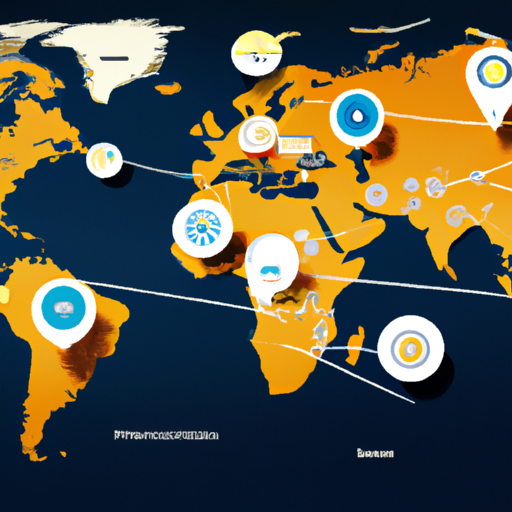Global Marketing: Your Guide to Global Marketing Strategy
Crafting a Global Marketing Strategy: Navigating Challenges and Reaping the Rewards
Expanding your business to the global market can be a lucrative move, but it requires a well-thought-out global marketing strategy. This strategy involves marketing your brand and products/services on a worldwide scale, using the same messaging across different countries and regions. However, it's important to adapt your marketing mix to align with local economic conditions, cultural customs, buying habits, and other factors. In this article, we will discuss the key steps to building a successful global marketing strategy, the challenges you might face, and the benefits you can expect to gain.
Building Your Global Marketing Strategy: The Steps to Success
1. Deep Dive Into Market Research
Before expanding your business globally, it's crucial to conduct market research to understand consumer behaviors, preferences, economic conditions, and competitive landscapes in different countries and cultures. This research will provide valuable insights and help you tailor your strategy to meet the expectations and needs of local markets. It will also enable you to segment your global consumer base into smaller groups based on country or region, allowing you to customize your messaging accordingly.
2. Localize Your Marketing Mix
Adapting the 4 Ps of marketing (product, price, place, and promotion) for local markets is essential in a global marketing strategy. By understanding local tastes, preferences, economic conditions, and buying habits, you can tailor your products/services, pricing, distribution channels, and marketing messaging to resonate with specific markets. This localization will create a sense of familiarity and relevance in your global marketing efforts, building trust and engagement among consumers.
3. Solidify Your Global Brand
While maintaining a consistent brand image globally, it’s important to be flexible enough to adapt to local conditions. Incorporating local cultural elements into your offerings can enhance relevance and appeal to diverse markets. Prominent global brands like Disney have successfully integrated elements from different cultures while preserving their core identity, creating a unique experience for consumers worldwide.
4. Keep Adapting
A successful global marketing strategy requires constant adaptation based on consumer feedback and market dynamics. By using data and insights, you can refine your strategy, adjust for missteps, and stay ahead of the competition. Even multinational brands have recovered from mistakes by promptly adapting their global marketing efforts, demonstrating the importance of learning and iterating as you go.
Challenges for Global Marketing: Navigating the Obstacles
Expanding your business globally comes with its own set of challenges. Here are some of the main ones you need to be prepared for:
1. Cultural Differences: Understanding and respecting local customs, values, and consumer behavior is crucial for a successful global marketing strategy. Failing to do so can lead to misunderstandings, alienation of consumers, and even legal issues.
2. Language Barriers: Translating marketing messages and slogans accurately while retaining their intended meaning can be complex. Working with native speakers who understand the nuances of language is essential to avoid embarrassing or misleading translations.
3. Regulatory and Legal Compliance: Every country has different laws and regulations regarding advertising, product standards, consumer rights, and other areas of sales and marketing. Understanding and complying with these regulations is vital to avoid penalties or damage to your brand reputation.
4. Local Business Landscape: Competing against well-established local and international brands can be challenging. Researching the competitive landscape, identifying market gaps, and finding unique value propositions can help you gain market share.
Benefits of a Global Marketing Strategy: Reaping the Rewards
Implementing a global marketing strategy can bring significant benefits to your business:
1. Larger Customer Base: Expanding your marketing efforts globally exposes your brand and offerings to a larger audience, potentially leading to increased sales and revenue. Diversified product lines tailored to local markets can also appeal to different needs and tastes, further boosting sales.
2. Diversified Risk: Operating in multiple markets reduces the financial risk if sales lag in specific areas. If one market faces challenges, your business can rely on revenue from other markets to offset any losses.
3. Stronger Brand: A global presence enhances brand recognition and familiarity among consumers. It also provides a competitive advantage over local and international competitors. Studies have shown that customers are more likely to buy new products from brands they recognize.
4. Supply Chain Efficiency: A worldwide presence enables easier access to raw materials and global suppliers, reducing costs and enabling faster manufacturing and delivery. This efficiency can give your business a competitive edge in terms of availability and pricing.
In summary, expanding your business to the global market requires a solid global marketing strategy tailored to local markets. This strategy should be based on thorough market research, adaptability to local customs and preferences, and a willingness to continually adapt and refine your approach. While there are challenges to overcome, the rewards of increased brand recognition, larger customer base, reduced financial risk, and supply chain efficiency make global marketing a worthwhile endeavor for businesses with international aspirations.
